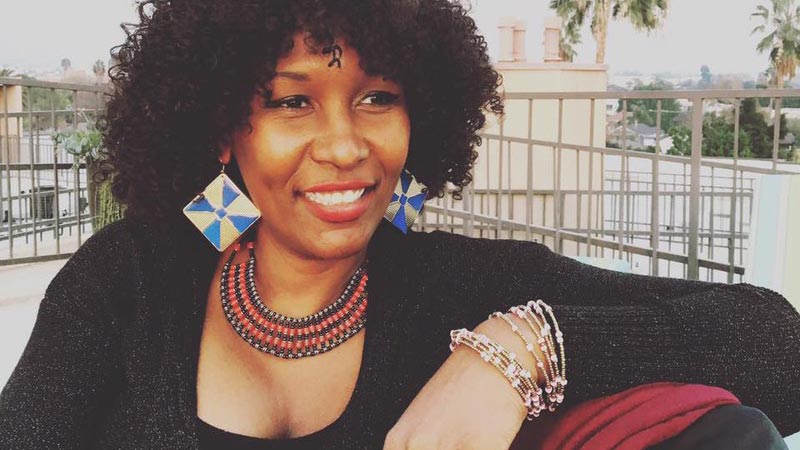
11 Sep Interview with Wanjiru Njendu, Director of Boxed (2020)
The film Boxed (2020) by director Wanjiru Njendu was awarded the 2020 Free Speech Award by AmericanINSIGHT’s Free Speech Film Festival. This interview with Wanjiru Njendu was conducted Summer 2020. Join us online for the award ceremony and meet the film’s Hollywood director, Wanjiru Njendu. Hosted online by Karen Curry, former NBC + CNN Bureau Chief, on Sunday, September 20th from 4-5:30 PM.
—
Free Speech Film Festival: Tell us about yourself. How has making your film impacted who you are today?
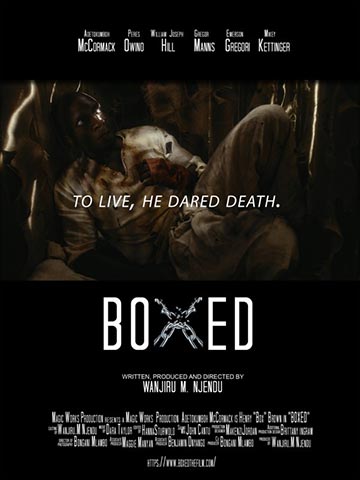
Poster for Boxed (2020)
FSFF: What is your response to those who haven’t learned about Henry “Box” Brown?
WN: I said, if I tell this story I want to humanize him and I want accountability. So in humanizing him I wanted everyone to experience what he went through because of what he was seen as at the time – property and not a man. But for accountability, the way I shot it with him experiencing everything from the voices and everything around him, I want the audience to also be accountable because when you don’t stand up for something, you are accountable for grievances and crimes that happen against humanity.
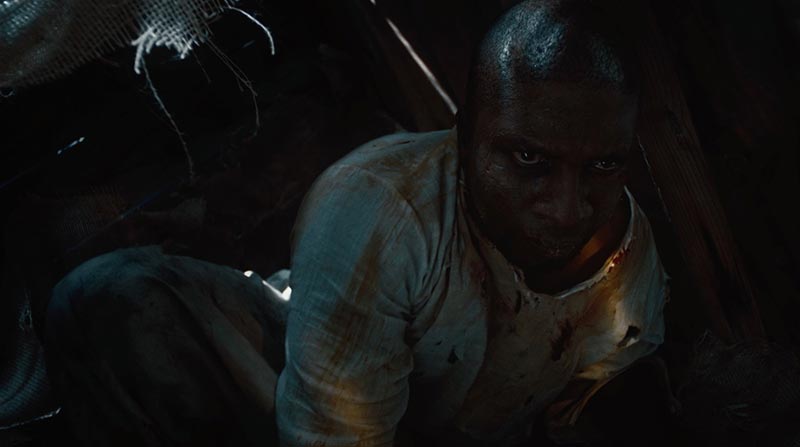
Still from Boxed (2020)
FSFF: Why did you choose to show this topic? What made it stand out to you? Why do you think it will stand out to others?
WN: I always like to tell people the film found me. You know sometimes you are always writing and sometimes the project finds you. I am not one of those writers who are only working on one thing, I am very fluid with it and how I let stories find me. I think you become a better filmmaker that way.
There was a different project I was trying to make and we didn’t get [our] crowdfunding goal and thus didn’t get greenlit to get the funds, so I was like what can I do with my money that I had in my account and in the process of just thinking that, I went for an event in Hollywood and met Karyn Parsons, who used to play Hilary on The Fresh Prince of Bel-Air, and she runs a company called Sweet Blackberry that shoots animated films on Netflix about American history.
So just having a conversation with her and listening to her talk about Sweet Blackberry because I knew about Henry “Box” Brown’s story, there is a museum in Boston that has a replica box. And it is one of those things that you know but don’t remember until someone speaks about them. And I had a bit of a mental block in terms of my writing because a friend of mine committed suicide and a lot of us had been struggling to understand why. He was very happy and very successful, and then I realized when talking to Karyn what it was.
Chains are not just physical they are mental. Mental health and mental issues. And when I got the idea I could not stop thinking about what she said in the panel and I couldn’t stop thinking about my friend. And the two were somehow tied and I kept going back and forth. Then I went home and I started making notes and I went to bed and then I woke up at 2:30 in the morning and wrote the film. And that’s what I shot. The entirety of the story came. I wanted it to be in four parts: midday, dusk, night, and dawn, because light was going to be an aspect of the film.
And once I figured out I really wanted it to be focused on just him in the box, I wanted him to be real, because that’s what a lot of people in power, people who misuse power take away from others. They take away your ability to speak, your ability to freedom and that’s all tied to voices. Once I figured out all those elements, I wrote it and I knew what I wanted him to hear, to experience, and specific fears. I focused on the emotional journey. And that’s how it came together, just an inspirational conversation. Steven Spielberg calls it “listening to the whisper.” Once I was able to figure out Henry’s journey and the journey to my own feelings with my friend’s suicide, it was dedicated to him as a result.
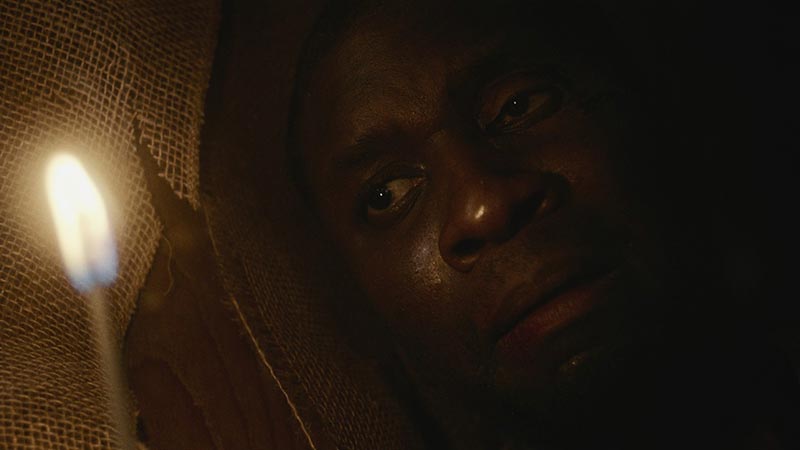
Still from Boxed (2020)
FSFF: You made this film for a reason. What kind of change do you think it will bring about?
WN: It’s sparking conversation. The best example of change I can give was that I got a festival request to submit the film so I submitted it and I completely forgot about it. It was a tiny town in Canada. So I emailed the US embassy asking if I could go visit and they funded my trip. And they were really friendly, in Canada, at the time I was doing Keto and they bent over backwards for me, giving me all these Keto meals. But, I was sitting at the filmmaker panel in a small audience of about 70 people and their response was they did not know this about American history. They knew slavery was physically violent but they never thought of the mental aspect. And they asked what else they could watch, what they could learn.
This was the Friday before When They See Us came out and I told them to go home and to put on, When They See Us. And the entire audience kept sending me emails saying, “Oh my God, we did not know about this.” Ava’s platform is so much bigger, but this little town would not have watched, When They See Us, so being able to have that conversation brought change.
In another festival, there was a Freedom Rider in the audience and he came to my Director of Photography, Bongani Mlambo, and said, “You put me back in that exact space when we were riding those buses and we were just trying to survive and live.” To have someone who lived this just a few decades ago, and the experience of someone from over 200 years ago, and say this is the exact same thing. He said “I’ve never been able to articulate, so I need people to see this film because this film shows people what I went through.” It’s already sparking conversation.
My friend told me she had her 8 year old son and he cried but I needed my son to see this film. Parents are taking this to teach their kids that this is where we come from and we are still fighting for the same things. It’s sparking conversation, it’s sparking research, but my biggest memory is being in this tiny Canadian town and everyone asking “What else can we watch?” and then following through with it. And this is the power of film. I can tie something I did to another atrocity that happened and they’ll make the time to educate themselves and understand that we have a president who’s not only responsible for atrocities against these boys, but is now in an ultimate position of power. And what we are trying to say is you speak up before we get to the level we’re at. We are in a box right now, literally. We are trying to get ourselves out of the box we’re in.
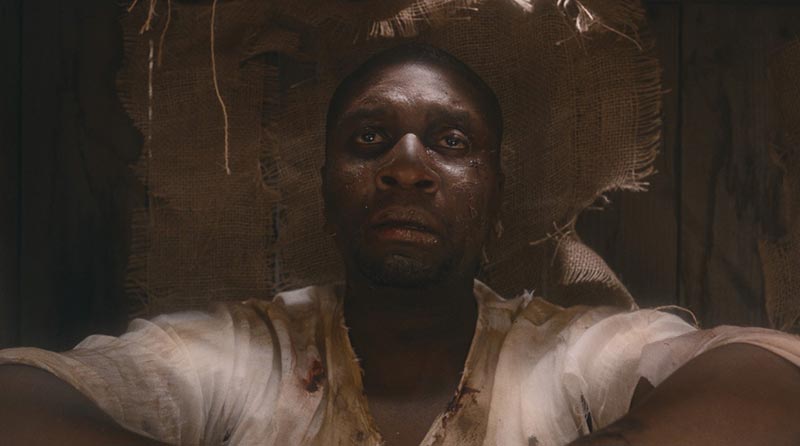
Still from Boxed (2020)
FSFF: Boxed had to do with slavery and escaping slavery. Do you feel that we are still in a form of slavery as black individuals?
WN: Absolutely, absolutely. People tend to think about the physicality of slavery, but don’t think about the elements and structure that were put in after. You cannot free an entire people and then compensate their masters and give people no land, no nothing. That is the exact same situation that is happening in Zimbabwe.
The government is saying they are going to compensate white farmers. What is happening? Look at Libya, people are trying to migrate as refugees while being sold off as slaves. Just this week there was a report that said Greece put 100 Somalian and South Africans refugees on boats and left them in the middle of the ocean. And so the structures are still here, not just in the US, and it’s not just the physicality, it changed. It changed from working in the cotton fields to child trafficking. That’s the new form of slavery. It changed to the point of you walking into a space and you not getting a job because of your hair that is considered “unprofessional.”
I talk with Matthew Cherry, he directed Hair Love, he just posted about Deandre Arnold, who had just wanted to go to school with his dreadlocks. We talked about that and his action plan to bring him to the Oscars, which he did. A judge ruled that the school was discriminating. We should not be having this conversation. It’s not about the physical owning of the person it’s also about what you put in place and what you police about that. Haiti right now is suing France for reparations because France was collecting from Haiti for owning them. Then France turns around and says, no we are not going to pay you back, and that’s money that has been keeping France afloat.
There are so many ways that resources are being taken away from the African continent. There is no way Congo should be in the state that it’s in, it has some of the most valuable resources in the world. I think that because slavery was so big in the US that it is only seen in one form. But that’s the thing, it is not only one form. It is like a virus, it mutated. I think it changed from a physical ownership to a manipulative ownership. How loans and banks are given, to generational wealth, the fact that every time you walk into a room you have to work twice as hard to get half of everything.
I was talking to a potential manager who asked me what was the hardest thing and I told him I have to wake up black and a woman. And a lot of his clients are black and I asked why and he said he grew up with black kids, there were just his friends, so he made it a responsibility that he was going to lift up black actors and he does. His whole roster is people of color. When I get out of bed I sigh and I just want to get out of bed and not have to sigh, and that will be the ultimate freedom.
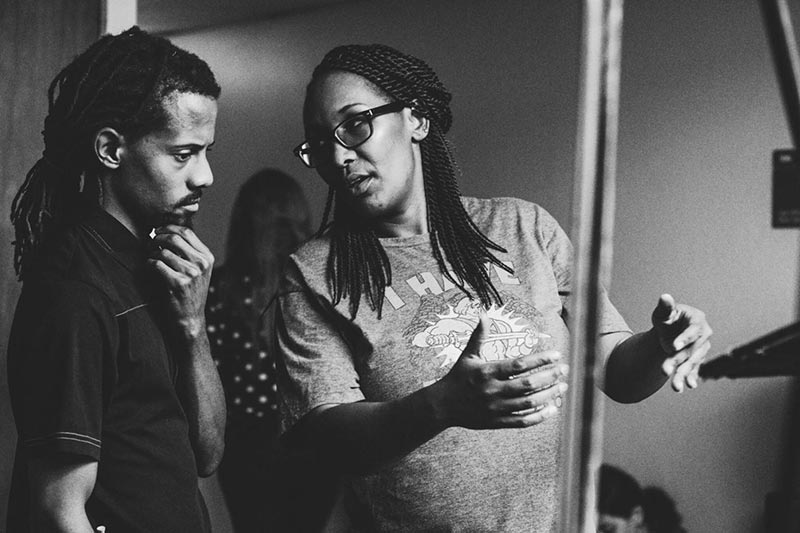
Behind the scenes moment from Boxed (2020)
FSFF: How can those who may not have free speech make a difference in their communities?
WN: Just be aware of the person right next to you. It’s funny, people think you have to do these big gestures and big things, but it’s just as simple as being human to the next person. I think people have forgotten about basic humanity. It’s funny because when we were raising my nephews and they were just at the height of seeing everything change from Obama to Trump and they started getting fears and it’s hard to see adult fears in a child. So when trying to explain to them, they wanted to be these little activists, like no, no, you get to just be kids.
That being said, one of my favorite scenes in a film is from The Hobbit Galadriel asks Gandalf, “Why the halfling?” and Saruman believes that it’s this big epic with sweeping gestures, and he turns around and says it’s just the little things. Like for me if I see a woman being made uncomfortable by a man, I will speak up, even if it’s not safe. Just being kind, just being aware of another human being, just sitting there and thinking about how you share content. Being conscious of what you share on information about the issues.
I have people tell me, “I get up and go straight to your page to see what you posted, what you tweeted, because it’s going to be so funny and uplifting.” And I’m just like, why can’t we put that positivity into the world? There’s a lot of negativity but if I post a funny tweet about a dog that’s dancing to WAP, it’ll make people laugh. And so, one of the ways I try to do it is if somebody asks if I have 30 minutes to jump on a call, then sure I can jump on a call, or if somebody asks if they can get some guidance, I try to mentor where I can. One of the things I try to do is if I see a resource I just send it out, so it’s just little things like that. It can be grand gestures as going canvassing for Biden, Harris, or it can talking to a friend who’s said “I’ve never voted, but now I want to vote.” Well if you want to talk about local government I can talk to you about that.
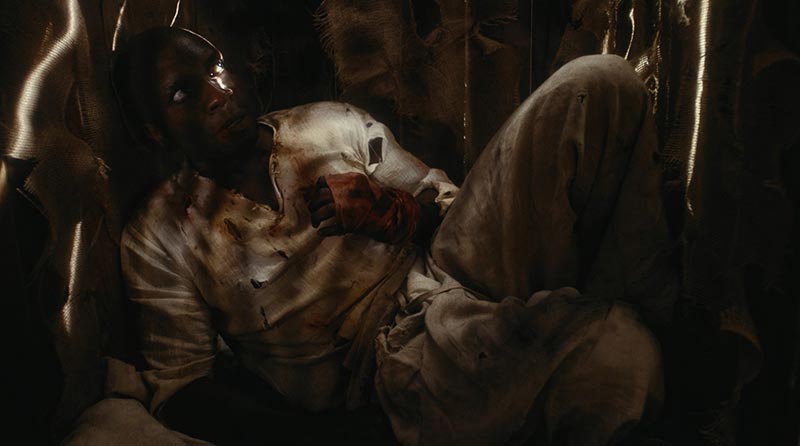
Still from Boxed (2020)
FSFF: What is your main message that you are trying to convey from your film? What would you say to a person who disagrees with the stance you are trying to take?
WN: My stance is just be human, do better, speak up. If someone doesn’t agree with my stance then they are people who believe people should own people. I sit and I tell them, “If that’s the way you think, then would you be okay with the reverse being in place?” Because you say that people needed enslaved people to progress, so would you be okay if the enslaved people are white and the owners are black?” And that usually throws them for a loop. The film is so human in its nature that I haven’t come across anybody who is just like “no, no it’s not that.”
My DP and I joke that we still cry in screenings of it, and we used to be like we made this film and we cry with tears coming out and we have to compose ourselves. I’ve been fortunate enough that this is not the type of film that is not up for debate. The way we told this film is not up for debate. What’s wrong is wrong. This man was just trying to live and he had to make some choices and some hard choices as you could see in the film, but he made his choices and he chose life and you can’t fault anyone for that. I like what Beyonce said in Black Is King “life is your birthright, it was written in the fine print, don’t let them fool you.” Everybody has the right to life, you can’t sit here and just deny the simple humanity of getting to get up everyday under sky and above ground.
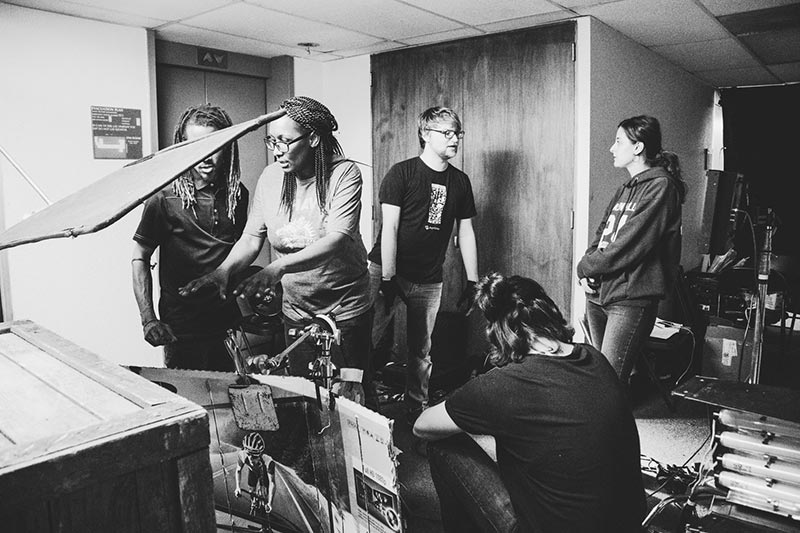
Behind the scenes moment from Boxed (2020)
FSFF: Did you always want to go into filmmaking?
WN: Absolutely, since I was 8 years old. I blame E.T the Extra-Terrestrial that’s the film that I didn’t understand what I had seen, but I think the best films connect to the pure, basic aspects of humanity. It could be a little alien or it could be Henry “Box” Brown’s story, but I sat [and watched] E.T as a kid and that was it. I did not know what I just watched, I didn’t know how to make it, but I told my dad I wanted to do that and he never let me waiver from my path. I have a very supportive father, my mother passed away when I was a teenager but she was very supportive, and my siblings are very supportive. I make them read everything, they watch every cut, even though they don’t have any notes. They were the very first people I showed Boxed to and based on their reaction, they did not know how I was dealing with my friend’s death. It was very strange because for a lot of people they thought I was dealing with my friend’s death okay, but then they were like “It really hit you harder than we thought.”
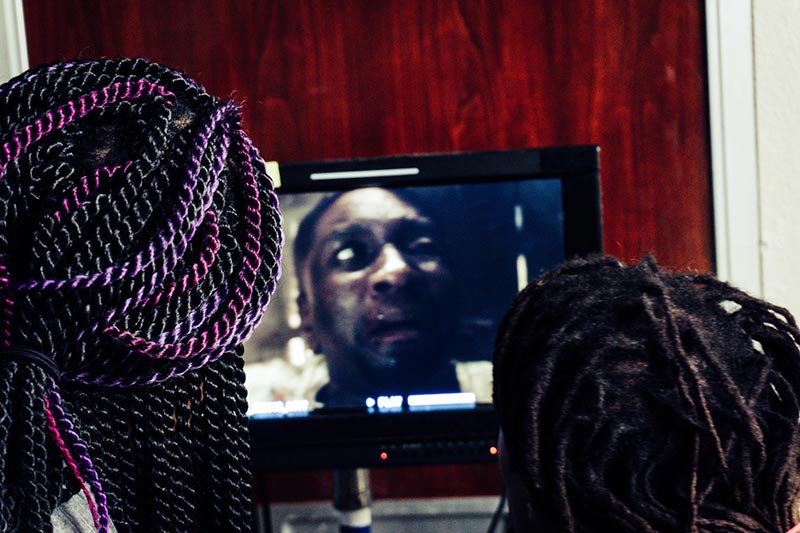
Behind the scenes on Boxed (2020): Reviewing footage on the monitor.
FSFF: How did you feel after finally finishing Boxed?
WN: On the technical side we had to shoot in a box, so we had to design everything. So on set I was timing everything and just making sure as we’re doing the voice over sessions, so it was a feeling of accomplishment and peace. It’s very strange to describe this but first I was fully at peace with my friend’s death and I had a lot going on. I had just left Universal Pictures, I had a soft, cushy job, I was dealing with fibroids, I was fighting with my own health. And so, the process of making Boxed, in the way that it happened also let me not be too much in my head. Originally, my surgery was going to be in July, and I didn’t want a surgery in the middle of summer, and they called me and said they had a spot open up, and I had just met with my DP. So I had to put together this film, put together the elements, and shoot.
We had this tiny box with all the equipment around it, and we were using a friend’s office. It was a large space, but once you put all the equipment in it it shrinks, and the bathroom was behind the box. I kept having my AD hold for me because when you have fibroids you have to pee often. And so having all this, having to make this film, and having to be the captain it still was a sense of peace. It was also like a rebirth.
Part of the reason why I left Universal is because the surgery required an extensive recovery period and I was always on film to film to film basis in their Creative Marketing Department and I had not taken time for myself. It was almost like being reborn to finish the film because my fibroids were out, my hair grew back in, and I was ready to be a director again. I was just ready for the world to see it.
Nobody in my cast and crew spoke for five minutes after I screened it to them and I didn’t break the silence, I just let them sit and understand what they created. I was in a room with everybody who was responsible for what was in my head. There was just a feeling of connection with my white actors, my black actors, and just the humanity in that moment. I created a piece of humanity and I created something that whether it screened today or screened tomorrow it’s going to have the same conversation. It was peace and accomplishment.
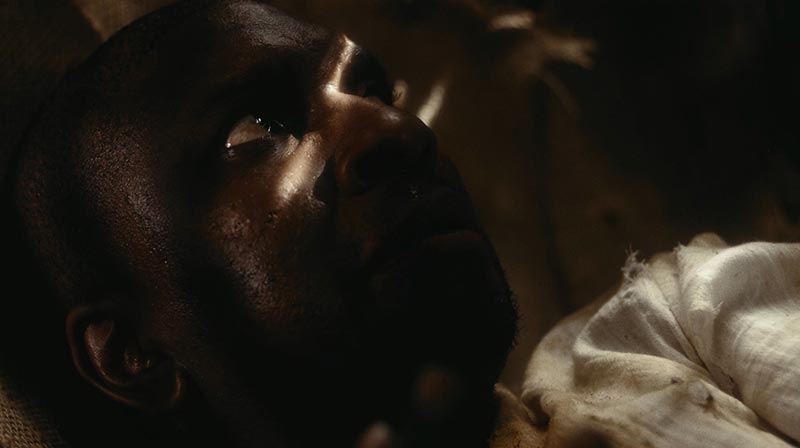
Still from Boxed (2020)
FSFF: What advice would you give to your past self and to the younger generation about finding your freedom to speak?
WN: It’s filled with fear but jump anyway. As filmmakers we’re too much in our heads and I had to build confidence. So I took a break from directing because I got into a really bad accident and I was fine, but I needed physical therapy. And that’s why I took the consulting job at Universal. I was on and off for four and a half years, which was great because I remember seeing Denzel Washington’s speech on how to Fall Forward, and I remember thinking, “I’m such a failure.” Then, two weeks later, “Hold up, I’m sitting on a team that makes a certain number of billions, I’m on five films, two of them are Academy award campaigns, so how am I going to learn from this?”
So it taught me a level of confidence, because we’ve been taught not to occupy space. But it also taught me that if you’re not interrupting a space people will let you be in to learn. And then they talk about the next great list. I would tell younger me, don’t listen to the lists, they can be a trap if you are focusing on them. So, I looked at my accident as me failing because I had to go back to a “job”, but I did not realize I was still doing what I wanted to do from a different capacity so I looked at my accident and asked how can I learn from it?
I got to see contracts that as an Indie filmmaker I’ve never seen because on the studio side everything was open access. I’d tell myself, look at every failure as an ability to learn, look at anything that holds you back as how you can reassess and how your path has adjusted. Just be gentle with yourself. Being hard on ourselves we really beat ourselves up on how to make everything perfect and polished. Just remember the first rule of being a filmmaker is be human, be kind to your crew, try to know everyone by name, try to figure out everyone’s favorite snacks. Capri-Sun pouches are always a hit on set. Just let yourself learn from every obstacle that comes your way.
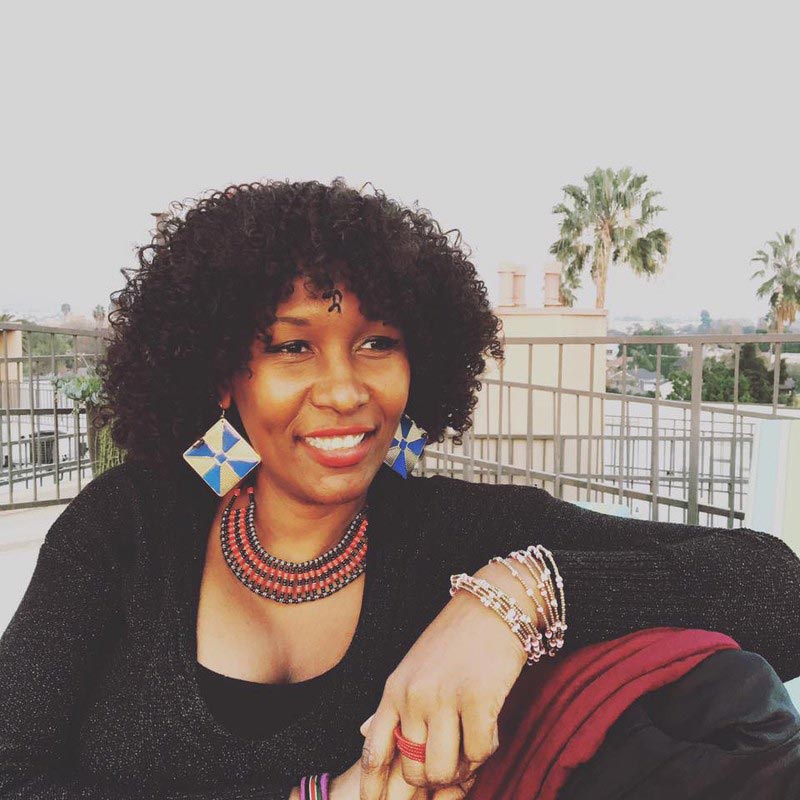
Wanjiru Njendu, director of Boxed (2020)
FSFF: Do you have any other projects you are working on? What do you see in your future?
WN: I just directed something at the top of the year, it’s a horror short. It got picked up by 20th Digital Studios, so that’s the one that’s starting the festival circuit in October at the Cannes Series Film Festival. I am in development with a coming of age drama about a black violinist. There is no societal trauma, she is just a teenager fighting with her parents who are trying to make her the perfect little musical prodigy. It is the most beautiful script I’ve read and she’s just human. I am also in development with a comedy-horror feature, I just had my website redesigned. But, I’ve been pitching a lot, writing an animation with my 16 year old nephew, he pitched me a story and I was like, oh my god! So for the last three weeks we’ve been writing, working on the story with his supervision. I never thought my writing partner would be a 16 year old. But mostly right now it is just pitching.
In spite of everything I’ve accomplished and done, I’m still taking representation meetings. I’m doing Zoom sessions, but things are starting to pick up slowly. I picked up a comedy short to direct my DP’s sister in it. She is an amazing actress. And then my DP and I were talking about doing a remote shoot with one of his other sisters who’s an actress as well.
And reading, one thing I’ve been doing during Covid is reading, doing a lot of behind the scenes, watching The Mandalorian, and the making of it. Virtual sets I tell you! But a lot of people think being a director means being on set all the time and no I’m doing my coloring books, I’m doing my projects and my vision board and all that stuff. I tell myself, I have to accomplish three big things today, I don’t know what they are, but when I wake up I have a list, and I look at the list, and I pick one. When you take away societal pressure you actually create with a better mind.
Film Summary
Director: Wanjiru Njendu
Cast: Adetokumboh M’Cormack, Peres Owino, Gregor Manns, William Joseph Hill, Emerson Gregori, Mikey Kettinger
Writer: Wanjiru Njendu
Producer: Wanjiru Njendu, Bongani Mlambo (Co-Producer)
Year of Production: 2020
Runtime: 6:09
Language: English
—
Interviewer: Chynna, 2020 American INSIGHT Intern, Temple University, 2021
All images courtesy of Wanjiru Njendu


No Comments